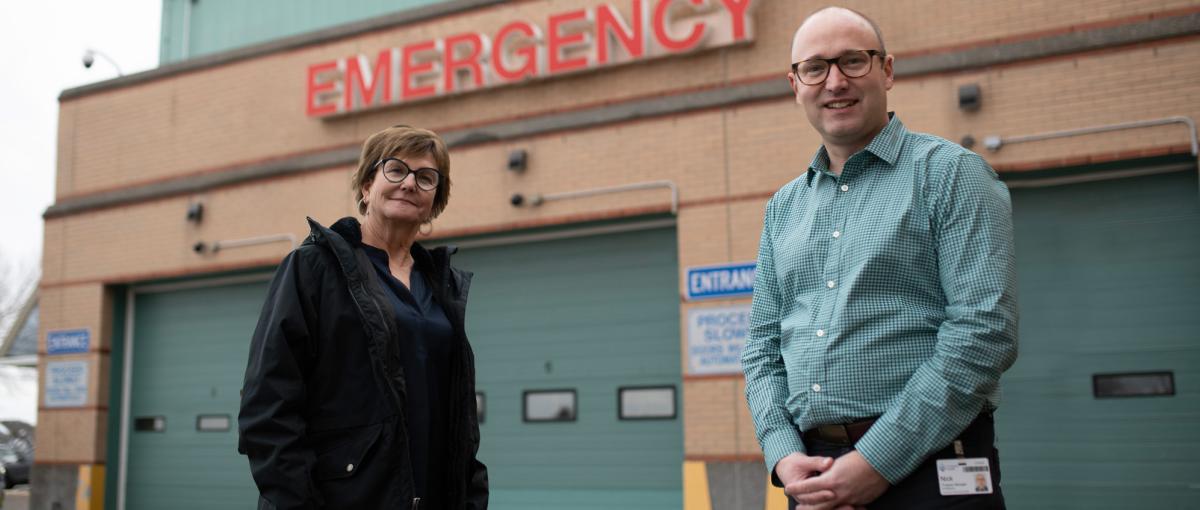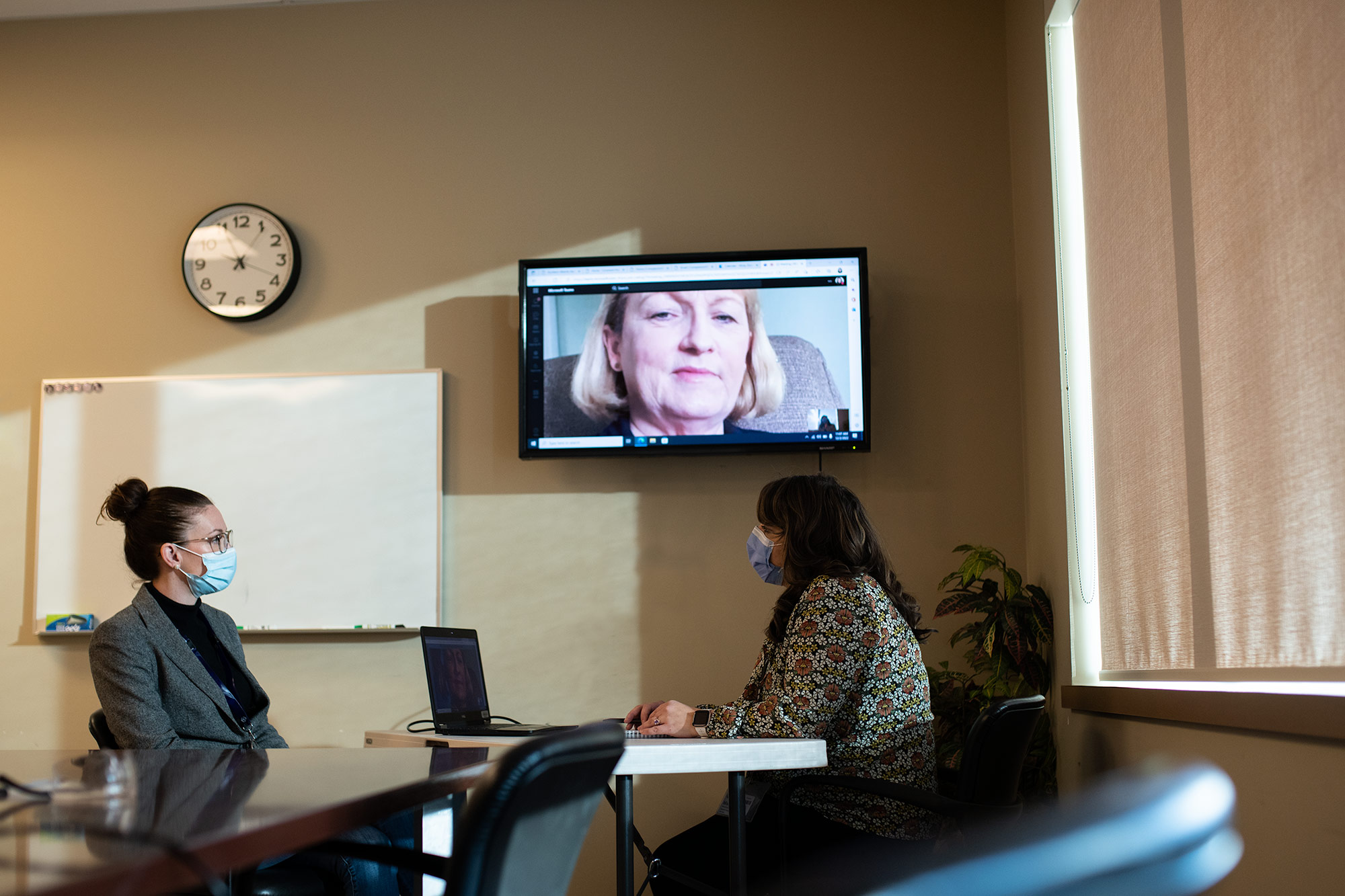Improving the patient and resident care journey
Covenant launches a pilot project to get perspectives from community volunteers

December 12, 2022
By Carla Howatt, Senior Advisor, Covenant Health
There was a time when Arlene McDougall stood side by side with her husband, helping him run his land development company. With a background in marketing, she spent years adding to the success of their business. But when Arlene’s husband passed away suddenly in February of 2021, life as she knew it changed.
She found herself with more time on her hands than she wanted. She wanted to do something very different from what she had done in the past, and she wanted to serve others. “I needed… to get myself out there and get interested in something,” Arlene says.
As she combed through websites, she came across information about Covenant’s Patient/Resident & Family Engagement program, which led her to become involved in a pilot project looking to resolve challenges in the care journey patients and residents experience. Partners from the community shadow the journey a patient or resident takes. They are then able to view the process through non-medical eyes and give feedback based on that perspective.
The whole idea for the pilot project arose in the winter of 2020 when the patient and resident engagement team decided to prioritize the patient/resident journey. It encouraged Covenant sites to apply to participate. Many stepped up to the challenge, and the team had the difficult task of choosing three sites from all the applications.
The three sites chosen included Villas Caritas and the Grey Nuns Community Hospital in Edmonton and St. Michael’s Health Centre in Lethbridge.
For Lisa Mazur, program manager for administration, and Misty Zisin, clinical nurse specialist for geriatric psychiatry, at Villa Caritas, the ability to choose their own issue had the added benefit of helping staff really buy into the program.
“The topic was chosen by our staff and with a lot of team input over many different conversations,” says Misty.
Villas Caritas wanted to tackle the issue of lost and misplaced patient property, and the Grey Nuns hospital wanted to improve the waiting process within the emergency department.
After Arlene applied to be a community partner in the pilot, she was assigned to the Grey Nuns emergency department. She soon realized that her marketing skill set — a knowledge of human nature and what makes for a satisfied customer — would be transferable.
Although still in the early stages of the work, she says the people are amazing and she has had nothing but good experiences as someone who has accessed the department in the past.
“I’m thrilled that I’m at the Grey Nuns. I’m really thrilled that they put me there. That’s kind of my hospital that if something happens, that’s where I have a lot of my experiences.”
While the Grey Nuns pilot project has not yet reached the stage where Arlene can begin shadowing patients, both she and the hospital have complementary goals. Nick Beil, emergency department program manager and the leader liaison for the project, says the hospital’s goal is to improve the triage process from the perspectives of the patient and the care provider. And Arlene says she has a strong desire to not only improve the emergency department visit for patients but also help staff and improve things for them.
“The healthcare system is getting a pretty bad rap right now,” Arlene explains. “You watch the doctors and nurses and how much stress they’re carrying.”
While Arlene made the jump from marketing to the emergency room, Marianne Sheppard was more at home in a hospital, where she spent her career as a psychiatric social worker. She worked for 15 years at Alberta Hospital in geriatric psychiatry before moving to Lynnwood to help start the mental health unit.
“I knew when I retired that I wanted to give back to my community and that I had a passion for psychiatry and geriatric psychiatry in particular.”
When she retired in 2016, she volunteered in the wound care clinic at the Misericordia hospital. It wasn’t long before they discovered her work history and asked her to volunteer at Villa Caritas.
At the same time, she was acting as the caregiver for her father, and he needed more and more help. So Marianne put her volunteer work on hold to be by his side. Sadly, he passed away in October 2021.
When she returned to volunteering at Villa Caritas, the patient journey pilot project seemed to be a great fit.
“I had a lot to do with patients and families but also in my caregiving with my Dad and before that with my Mom before she passed away, so I felt like I had the background.”

Lisa Mazur, Marianne Sheppard and Misty Zisin are working together to solve challenges for residents at Villa Caritas.
For Marianne, the shadowing she did at Villas Caritas uncovered some things that she already knew, based on her 25 years of experience. The number one complaint of families who have their elderly in care is the misplacement of items such as glasses, dentures and shoes, she says. Cutting down on the number of times this happens has the potential to reduce stress for the patient, their families and — as a result — the staff.
One of Marianne’s recommendations has been to emphasize communication between staff and families. There have been occasions when staff have spent time looking for items that the family has decided to take home. Conversations between staff and families are also opportunities to identify potential issues. Why is Dad always removing his dentures? Maybe they no longer fit properly or they are uncomfortable in some way.
Marianne also believes it is important to keep the family involved in the care and decisions made for their loved one. A family that insists on admission that their Dad wear his shoes may change their mind down the road, and that’s important for the caregivers to know.
Lisa agrees with Marianne’s recommendation and feels that her inclusion can do nothing but help the facility provide the best care possible.
“Bringing in patient and family presence and ideas, really, I think, helps build and strengthen the bonds of nursing.”